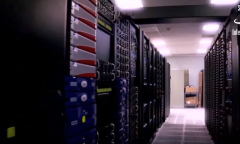By Prei Dy, | June 20, 2017

Artificial intelligence systems could be the next 'super weapon', according to a French researcher. (YouTube)
Atomic and thermonuclear bombs are now things of the past, as self-learning artificial intelligence systems could become the new super weapon of the 21st century, French futurist Jean-Christophe Boon said.
"To me, it seems that it will be artificial intelligence systems," Bonn said during a press conference in Kaspersky Lab. "For their function, unlike an atomic bomb, there is no need for uranium, or factories or other hard-to-reach materials. Only silicon and electricity are needed."
Like Us on Facebook
He further explained that artificial intelligence systems could not be traced, unlike uranium, plutonium, and other radionuclides. Thus, such a "super weapon" would be difficult and hard to predict.
"Politicians and representatives of the security agencies of France, Israel, and many other countries deny that they are developing similar systems for conducting cyber war... But it seems to me, these developments are being carried out and this is the main strategic task for most leading powers," he said.
Anton Shingarev, Kaspersky Lab's vice president, also noted that NATO nations consider cyberattacks and physical attacks equal and reserve the right to respond to such a threat in any manner they want.
Cyberweapons will also make attackers more vulnerable as existing industrial and military facilities utilize the same equipment and operate in similar principles and are connected on the same global network. On the other hand, cyberattack victim could also respond in a similar way.
Artificial intelligence could enhance threat detection, shorten defense response time, and improve ways of distinguishing real efforts from those that can be ignored. AI as well as quantum computers could also be useful in several military applications such as engaging in near-instantaneous hacking of encrypted military servers and controlling the enemy's infrastructure systems. It could also help enhance the performance of unmanned and autonomous military vehicles; be used on different phases of new weapons and even on making new war tactics; and predict how satellites software would behave.
-
Use of Coronavirus Pandemic Drones Raises Privacy Concerns: Drones Spread Fear, Local Officials Say

-
Coronavirus Hampers The Delivery Of Lockheed Martin F-35 Stealth Fighters For 2020

-
Instagram Speeds Up Plans to Add Account Memorialization Feature Due to COVID-19 Deaths

-
NASA: Perseverance Plans to Bring 'Mars Rock' to Earth in 2031

-
600 Dead And 3,000 In The Hospital as Iranians Believed Drinking High-Concentrations of Alcohol Can Cure The Coronavirus

-
600 Dead And 3,000 In The Hospital as Iranians Believed Drinking High-Concentrations of Alcohol Can Cure The Coronavirus

-
COVID-19: Doctors, Nurses Use Virtual Reality to Learn New Skills in Treating Coronavirus Patients













